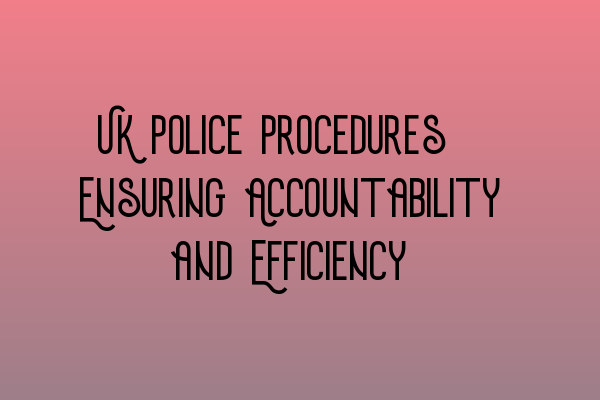UK Police Procedures: Ensuring Accountability and Efficiency
When it comes to upholding the law and ensuring public safety, the police play a pivotal role in society. Their actions and procedures should be held to the highest standards to ensure both accountability and efficiency. In this article, we will explore the key aspects of UK police procedures and how they contribute to a just and effective criminal justice system.
1. Arrest and Detention
One fundamental aspect of police procedures is the process of making an arrest and subsequent detention. The police must have reasonable grounds to believe that a person has committed or is about to commit a crime in order to make an arrest. This ensures that individuals are not wrongfully detained and their rights are protected. If you want to familiarize yourself with some common SQE 1 practice exam questions related to arrest and detention, click here.
2. Interviewing and Questioning
Once a suspect is in custody, the police conduct interviews and questioning to gather evidence and establish the facts. This process is crucial for building a strong case. Proper questioning techniques, such as adhering to the SQE 1 practice mocks guidelines, help ensure that statements are obtained lawfully and without coercion. These practices safeguard the rights of the accused while maintaining the integrity of the evidence gathered.
3. Evidence Collection and Preservation
The collection and preservation of evidence are critical for the successful prosecution of criminal cases. Police officers must be meticulous in their approach to handling and documenting evidence to prevent contamination or loss. If you are interested in learning more about evidence collection techniques, you can explore our SQE 2 preparation courses.
4. Search and Seizure
During the investigation process, the police may need to conduct searches and seize relevant items. These actions must be carried out within the boundaries set by the law to avoid violating individuals’ privacy rights. Understanding the legal parameters of search and seizure is crucial, and you can find information on this topic in our comprehensive SQE 1 preparation courses.
5. Interviewing Witnesses and Victims
Witnesses and victims play a pivotal role in any criminal case. Police officers must conduct interviews with sensitivity and respect, providing a supportive environment for individuals to share their experiences and provide essential information. For aspiring solicitors, honing these interview skills is vital, and we offer courses to help you prepare for such scenarios.
6. Fairness and Procedural Safeguards
Throughout the entire criminal justice process, fairness and procedural safeguards must be maintained. This ensures that all parties involved, including defendants, victims, and witnesses, are treated justly. It is important to stay updated on SRA SQE exam dates so you can plan your studies and ensure you have a comprehensive understanding of criminal law and practice.
By adhering to high standards of accountability and efficiency in police procedures, we can uphold the principles of justice and protect the rights of all individuals involved in the criminal justice system.
For more information on various legal topics and exam preparation, kindly explore our website.
